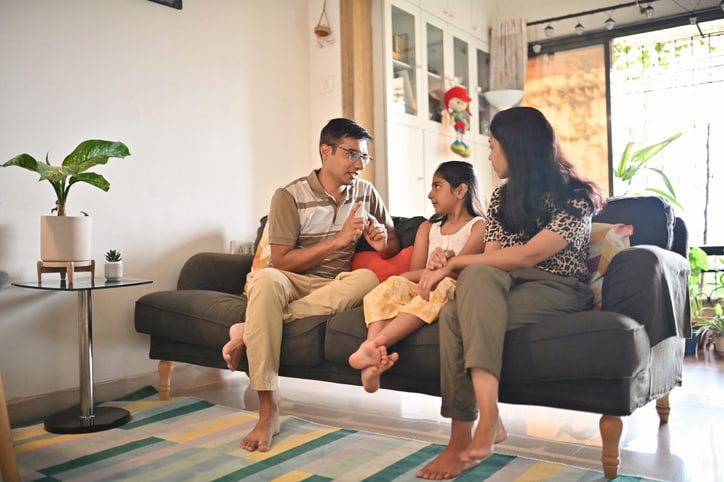Figuring out where your kids will go after school, what they’ll do and who will be watching them is a big child care challenge for many families. That’s why some parents turn to hiring an after-school nanny or an after-school babysitter to fill the child care gap from 3 p.m. to 5 p.m. (or 6 p.m. or 7 p.m.) in order to lighten the load.
As a working mom of five, Megan Metzger and her husband have something of a secret weapon for juggling it all: their after-school nanny. The family’s nanny picks up their kids from three different schools, helps with their homework, gets dinner ready and tidies up — all before they get home from work.
“She is amazing,” Metzger says. “The duties that she takes off my plate and my husband’s plate allow us to spend quality time with the children instead of all the little nuances that have to be done to help a home function.”
Finding the right fit for an after-school caregiver, however, can take some digging. If you’re weighing hiring a babysitter or nanny for after-school hours, here’s what you should look for.
After-school nanny/babysitter responsibilities
Inarguably, the most vital task after-school babysitters or nannies perform is watching your kids. It’s the primary reason you hire them: to make sure your kids get home from school safe and sound and are well cared for until you get home. But there might be other ways an after-school caregiver can make your life as a parent easier, too.
Cindy Marie Jenkins, for example, hired a babysitter to pick up her son from school 30 minutes away before caring for him and his younger sibling while she finished up her work day. As a writer who works from home in Orlando, Florida, Jenkins appreciated getting back the time she would have spent driving and liked that her babysitter frequently took the kids out of the house for fun after-school excursions. Those activities were important to her and her family.
Some other examples of activities an after-school babysitter or nanny might do include:
- Transport the child(ren) to and from after-school activities and sports.
- Help with homework or tutoring.
- Prepare snacks or dinner.
- Care for pets.
- Housekeeping, laundry or other home-related tasks.
Something to think about here: While nearly all caregivers will likely consider cleaning up after the kids or prepping their meals to be part of the gig, additional compensation might be expected for anything above and beyond the basic duties of child care. Make sure everyone’s clear on what is expected of them by laying it all out beforehand either verbally or — better yet — in a written agreement like a nanny contract or babysitter contract.
Hiring an after-school nanny vs. a babysitter
The difference between a nanny and a babysitter really comes down to expectations and experience, says Metzger, who also served as president of the International Nanny Association.
Families expect more from a nanny than a babysitter, she says. Both take care of the kids’ day-to-day needs and ensure house rules are followed, but nannies are much more involved in the big picture — how the kids are growing and maturing overall. While babysitters might check that the child finished their homework, they aren’t expected to know the child’s learning style or how they’re doing in school. Nannies are.
“Either [option] is going to have its pros and cons,” says Casey Smith, owner and director of Northlight Nannies in Michigan. “You just have to decide what your goals are for that period of time for your kids.”
Qualities to look for when hiring an after-school nanny or babysitter
Your kids are your world — you don’t want just anyone to care for them after school — but how do you know when you’ve found a good match? Here are some things to think about.
Experience, certifications and qualifications
Once you figure out what kind of caregiver you need, the next step is to lay out what qualifications are must-haves for your family. For Smith, it was important to find someone who was certified in CPR and first aid and who had formal in-house experience as a nanny. Metzger needed someone who had a valid driver’s license, a clean driving record and a solid background check. Others might prefer having a caregiver with a college degree.
Along with hard qualifications, some families have a list of soft qualities they’d like to have in a babysitter or nanny, such as resourcefulness or politeness. Metzger, for example, values a nanny who is family-oriented, fun, respectful and — above all — unflappable. With five kids ages 9 months to 13, she relies on her nanny to manage the needs of children, including homework and activities, at a wide range of ages and energy levels. “It’s a lot,” she says.
That said, finding someone who checks all your boxes won’t be easy. So it’s important to determine which qualifications are must-haves for your family and prioritize from there.
Strong communication
Jackie McClain, a grants manager and mom of two in Atlanta, remembers a time when her free-spirited nanny veered off-plan and was completely unreachable for a while. She didn’t know where her kids were or whether they were OK.
“I couldn’t get in touch with her because she just forgot to turn her cell phone on, and I panicked,” McClain says.
That experience underscored just how critical clear communication was for her. Families put a lot of trust in their child care provider to care for their kids while they are away. Finding someone you’ll be able to communicate with and rely on to keep you in the loop when you need them to is essential, McClain says.
Responsibility and reliability
Having to scramble to replace an after-school nanny or babysitter when they quit or cancel on short notice can be frazzling — especially for those whose jobs might not offer the flexibility or paid time off to fill in the gap. For McClain, having someone she could rely on to show up on time every day meant that she didn’t have to worry about being late herself.
While sudden illnesses and unexpected emergencies happen, finding a caregiver who can be there when you need them to be — and who won’t leave you in the lurch — makes all the difference.
Aligned priorities
In any given afternoon, a babysitter or nanny will have to make a lot of decisions regarding your child’s care. If you have strong preferences for your child’s after-school-activities or environment, you might want to consider making sure whomever you hire has views that align with yours or (at the very least) can get on board with your way of child-rearing. Some examples include:
- How much screen time they get and what kind.
- Positive guidance vs. disciplinary measures.
- Protecting bodily autonomy or providing opportunities to practice independence.
- Dietary choices (if the caregiver will be prepping food).
When McClain’s first child started preschool and she also had an infant, McClain wanted someone to continue providing an enriching environment for her young children until she could get home at the end of the workday. She found a nanny who liked thinking up creative activities and making sure the kids got plenty of sensory play.
“She really knew how to enrich our kids’ lives,” McClain says.
As her kids grew older, however, her priorities shifted. The out-of-box thinking became less important. Instead, she wanted a nanny who valued things like punctuality and staying organized as much as she did. When it came time to transition to a different nanny, she hired someone who reflected those values.
Finding the right fit for an after-school babysitter or nanny can take a little legwork. But thinking through some of these considerations might help make the search just a little easier.






